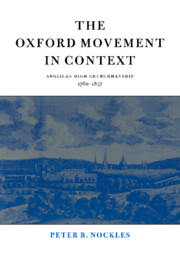Book contents
- Frontmatter
- Contents
- Preface
- List of abbreviations
- Historiographical introduction
- 1 Church and state: the politics of High Churchmanship
- 2 Antiquity and the rule of faith
- 3 Ecclesiology: the apostolic paradigm
- 4 Spirituality, liturgy and worship
- 5 The economy of salvation: sacraments and Justification
- 6 The old High Churchmen and Tractarians in historical relation
- Conclusion
- Select bibliography
- Index
2 - Antiquity and the rule of faith
Published online by Cambridge University Press: 23 September 2009
- Frontmatter
- Contents
- Preface
- List of abbreviations
- Historiographical introduction
- 1 Church and state: the politics of High Churchmanship
- 2 Antiquity and the rule of faith
- 3 Ecclesiology: the apostolic paradigm
- 4 Spirituality, liturgy and worship
- 5 The economy of salvation: sacraments and Justification
- 6 The old High Churchmen and Tractarians in historical relation
- Conclusion
- Select bibliography
- Index
Summary
THE PRE-TRAGTARIAN HIGH CHURCH LEGACY, 1760–1833
One facet of the High Church tradition on which the Tractarians drew was an appeal to the teaching of the primitive church exemplified in the writings of the early Fathers. High Churchmen did not deny that Holy Scripture, in the words of Article 6, ‘contained all things necessary unto salvation’, and that it was entirely sufficient as the rule or basis of faith. High Churchmen tended to argue that Scripture needed to be understood in the light of antiquity, properly understood. The documents of early Councils and the writings of the Fathers were generally regarded reverentially as testimonies to the ‘Faith once delivered unto the Saints’. In the classic Caroline divinity which embodied this approach, the rule for interpreting Scripture was deemed to consist in a consent of early Fathers and of those Councils of the early church considered truly ecumenical. This entailed an appeal to the authoritative teaching of the universal church of the first four centuries of Christian history. The principle of this appeal had been first formulated by the fifth-century Vincent of Lerins in his Commonitorium. It was enshrined in the Vincentian Canon, ‘quod semper, quod ubique, et quod ab omnibus’. Catholic truth could be ascertained not merely by reference to the letter of the Bible alone but by what in the early church had been taught always, everywhere, and by all.
- Type
- Chapter
- Information
- The Oxford Movement in ContextAnglican High Churchmanship, 1760–1857, pp. 104 - 145Publisher: Cambridge University PressPrint publication year: 1994



